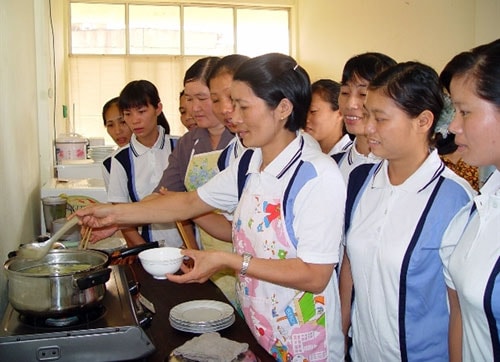Lack of skills, domestic workers become... a threat
Recently, a clip recorded the image of a maid beating a baby girl over 1 month old (Phu Ly City, Ha Nam), throwing the baby up high, stuffing a towel in her mouth to stop her from crying, causing public outrage. After the family reported, the police temporarily detained the maid. However, it is undeniable that there is concern about how to choose a "conscientious" maid when there is no training for the profession.
90% of domestic workers are untrained
According to a survey conducted by the Center for Gender, Family and Community Development (GFCD) in 2015, 90% of domestic workers in Vietnam have not received vocational training and mainly work based on experience. This is the reason for many conflicts with the employer's family during the work process or vice versa.
 |
| A training course for domestic helpers. Photo: Nguyet Ta |
"Every year, Vietnam records more than 4,500 cases of violence and child abuse, of which about 2,000 are cases of sexual abuse." Mr. Nguyen Trong An |
Surveys related to this group of workers have shown that nearly 90% of domestic workers are working without signing a written labor contract with the employer, so there is no basis to claim rights.
Ms. Ngo Thi Ngoc Anh - Director of GFCD said that currently in Vietnam, 98.6% of domestic workers are women, the average age is 44.8 years old, on average a domestic worker works about 11 hours/day. Due to limited awareness, many domestic workers are reluctant to attend vocational training classes, afraid of having to sign contracts for fear of being bound.
Meanwhile, Mr. Nguyen Trong An - former Deputy Director of the Department of Children (Ministry of Labor, Invalids and Social Affairs) said that hiring family teachers, especially to look after young children, is facing a problem - that is, there is no clear regulation in selecting and recruiting family teachers.
“Maids may have bad habits such as stealing or laziness, but those behaviors are not as scary as violent behavior towards children, because violent behavior can originate from mental disorders, so people can abuse children,” said Mr. An.
In other countries like the Philippines, Korea... the family tutor must first be physically examined. Meanwhile, in Vietnam, due to demand exceeding supply, many families accept hiring family tutors who have not been trained or whose background is unknown.
“Usually, homeowners find them themselves or ask for referrals from others, so it is not impossible that many people hire caregivers who have infectious diseases or mental health issues without knowing it. Therefore, families need to carefully select and recruit,” Mr. An recommended.
Not in compliance with regulations
Recently, in the workshop "Consultation on standard contracts for domestic workers in Vietnam" held in Hanoi, Ms. Tong Thi Minh - Director of the Department of Labor Relations and Wages (Ministry of Labor, Invalids and Social Affairs) said that domestic workers have been making important contributions to the global economy.
GVGĐ not only increases employment opportunities and wages for a segment of the workforce, but also creates more professional and quality care for the elderly, children, and disabled. However, this labor sector is facing many worrying issues.
The situation of domestic workers not being protected, having their salaries withheld, and then being stolen and violent by domestic workers still happens often. Many domestic workers from the countryside have not been trained, do not have skills, and work spontaneously, causing headaches for many homeowners.
In Vietnam, although the legal framework for GVGĐ has been issued relatively fully, in reality, most employers and employees do not fully understand or grasp the provisions of the law on labor. The signing of labor contracts is not complete, and the contents of the contracts are not clear.
According to Ms. Ngo Thi Ngoc Anh, legal regulations to protect the rights and interests of domestic workers have been issued but have not been effectively implemented. Decree No. 27/2014/ND-CP of the Government also details the implementation of a number of articles of the Labor Code on domestic workers.
According to Danviet
| RELATED NEWS |
|---|






.jpg)

